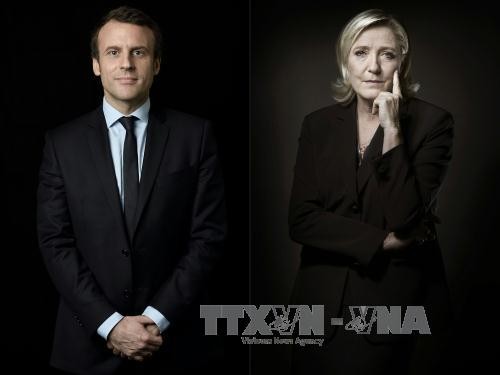(VOVworld) – The French presidential election and other elections in the Netherlands, Germany, and Italy could revive Europe or break it apart.
 |
Moderate centrist Emmanuel Macron and far-right populist Marine Le Pen will face each other in the presidential run-off on May 7 (Photo: AFP/VNA)
|
A lingering financial crisis, rising unemployment, and an influx of immigrants have frustrated European voters, who are shifting their support to new populist parties. This year’s elections will be fiercely contested.
What do the ballots mean?
The results of the first round of France’s presidential election mean that moderate centrist Emmanuel Macron and far-right populist Marine Le Pen will face each other in the presidential run-off on May 7. Macron led the voting with 23.8%, with Le Pen close behind at 21.5%. Le Pen's strong showing in the first round reflects a growing populism in France. Odds makers say the run-off is a toss-up.
Macron publicly supports the European Union and globalization. If he wins, the EU will be revived. During her campaign, Le Pen pledged to hold a referendum on France’s leaving the EU (Frexit). She also promised to tighten immigration policy and restore France’s monetary and budgetary sovereignty. France, the second largest economy in the Eurozone and the seventh largest economy in the world, was a founding member of the EU along with Germany.
The failure of Italian Prime Minister Matteo Renzi in a public referendum on constitutional reforms in May demonstrated the voters’ dissatisfaction. The two biggest opposition parties in Italy have voiced objections to the euro and a third party is likely to do so. Italy will hold a snap election this year, opening opportunities for right-wing parties who are skeptical about the EU. Any instability in Italy, the third largest economy in the Eurozone, will adversely affect the regional economy.
In the Netherlands, although the People's Party for Freedom and Democracy (VVD) of Prime Minister Mark Rutte won the Parliament’s Lower House election on March 15, the new government is facing widening division. The VVD lost 9 of its 41 seats in Parliament, while the far-right PVV added 7 to its 12 seats, showing the changing political order in Europe.
It appears the general elections in Germany, on the other hand, will leave the political balance there unchanged. Chancellor Angela Merkel remains the most powerful politician in Europe with an approval rating of 60%. She is expected to win another term in office despite strong opposition to her handling of the immigrant crisis.
The future of Europe
Europeans’ indignation over slow growth, high unemployment, social inequality, and waves of immigrants has fostered populism. It’s undeniable that in Austria, the Netherlands, Italy, and France populist parties are gaining strength.
The world is now using the term “Patriotic Spring” coined by Geert Wilders, leader of the the Dutch opposition PVV Party, to describe the recent wave of electoral success by right-wing parties with populist programs across the Western world. It’s too early to celebrate this trend. But when the glamour of globalization fades and people’s voices are not heard and their needs are not respected, populist movements may emerge.